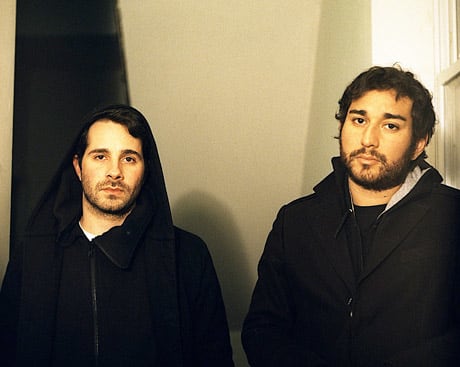A decade is an eternity for electronic musicians, especially if that decade stretches from 1999 to the present, which encompasses the career of Telefon Tel Aviv. Listeners have become accustomed to (or jaded by) both the most Byzantine constructions of electronica and its most minimal sketches. In a culture of musical composition so centred upon novelty and style, veteran programmers can easily find themselves well behind the crest of the latest wave. Chicago-based TTA remain relevant going into their second decade with the excellent Immolate Yourself. Once introspective and instrumental glitchmeisters supported by warm Rhodes melodies, they are now concise and vocal-driven, with straight ahead, danceable rhythms, but not at the expense of their sumptuous sound design. Opener "The Birds" sums up this shift - shoegaze-style vocals weave through chilly yet bent 16th-note synth undulations before a hard-stepping beat snaps the listener to attention. The simplifications of their sound descend into dullness the odd time, as on the monotonous beat of "Your Every Idol," but the flow always mutates into something more captivating. The care taken in the sound synthesis keeps this album from becoming an anonymous electro-pop rehash.
Have advances in technology forced you to update your equipment? Has that changed the way you make music?
Josh Eustis: I think we've been pretty good about keeping abreast of technological trends but they certainly don't rule the music. If anything, the more soft synths and digital tools flood the market, the more we turn away from them. It's a kind of hard-headed reflex that we have to try to use tools that aren't being used so much, or that are out of vogue.
Would you agree that there seems to be a more direct sound to the new album?
It is. It's all song-oriented and was written as songs first that got "produced" later. Even though the vocals are mostly buried and smeared, there should still be something to latch onto, hopefully.
How was the experience of writing lyrics and singing them different than what you had done previously?
All of that happened in the demo process, which is something we'd never done. We'd always written the song in ProTools, and from left to right, basically. It was fun to write melodies, chord changes and lyrics ahead of time. So the record was really made in two sections, as opposed to one really drawn out and painful one. We wrote first, we produced after.
(BPitch Control)Have advances in technology forced you to update your equipment? Has that changed the way you make music?
Josh Eustis: I think we've been pretty good about keeping abreast of technological trends but they certainly don't rule the music. If anything, the more soft synths and digital tools flood the market, the more we turn away from them. It's a kind of hard-headed reflex that we have to try to use tools that aren't being used so much, or that are out of vogue.
Would you agree that there seems to be a more direct sound to the new album?
It is. It's all song-oriented and was written as songs first that got "produced" later. Even though the vocals are mostly buried and smeared, there should still be something to latch onto, hopefully.
How was the experience of writing lyrics and singing them different than what you had done previously?
All of that happened in the demo process, which is something we'd never done. We'd always written the song in ProTools, and from left to right, basically. It was fun to write melodies, chord changes and lyrics ahead of time. So the record was really made in two sections, as opposed to one really drawn out and painful one. We wrote first, we produced after.
